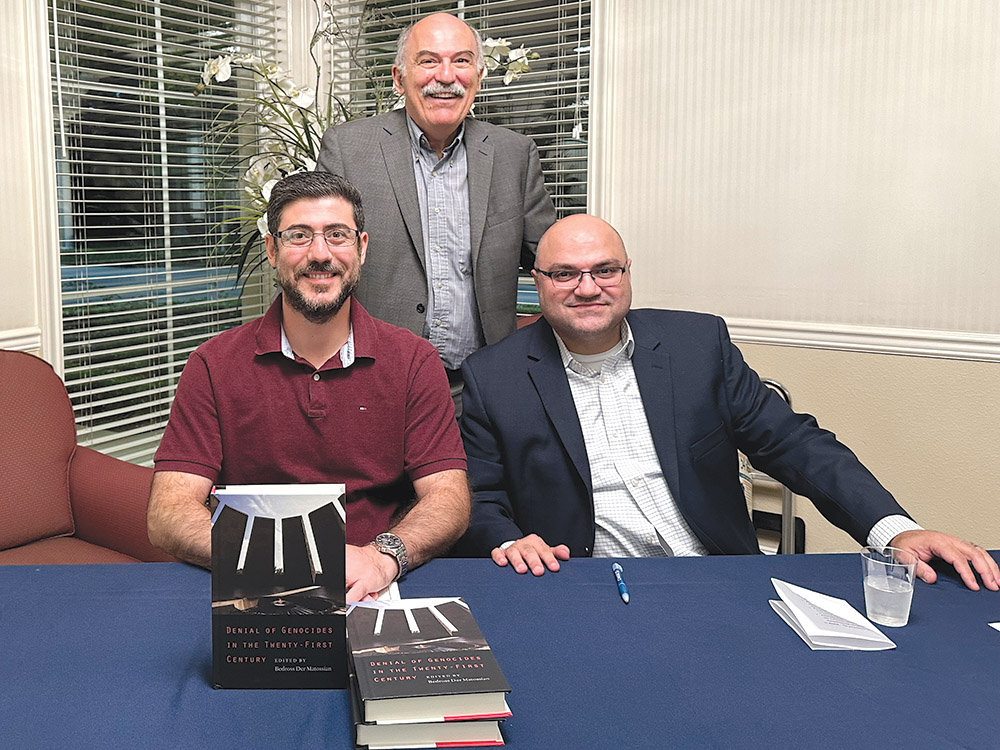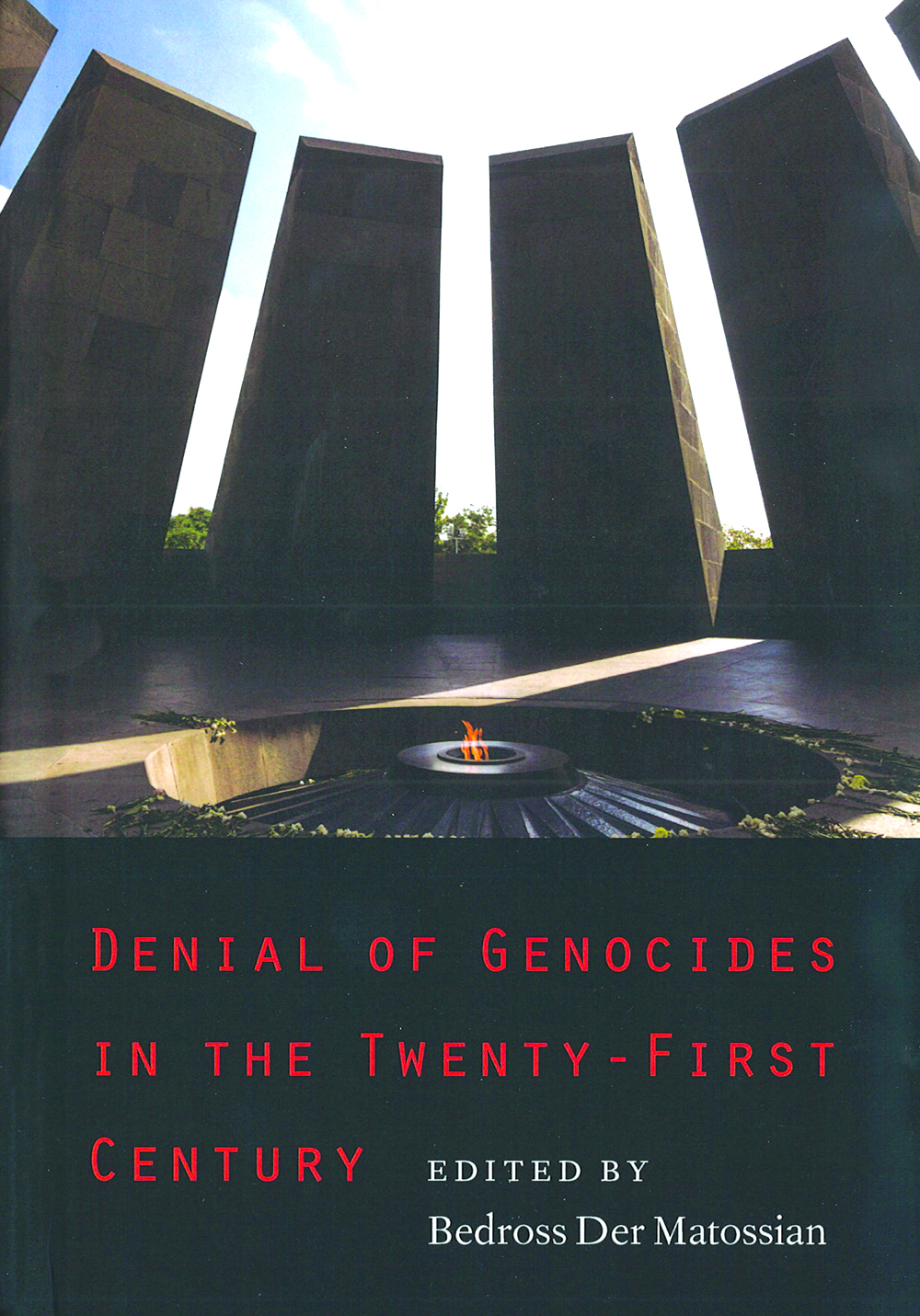
Careen Derkalousdian
Staff Writer
“Denial is not only the reluctance to acknowledge the historical injustices of the past but it further aims at killing the dead and their memory over and over, inflicting pain on the survivors and their descendants, and demonstrating that future acts of violence are possible in a climate of deception and impunity,” stated Dr. Bedross Der Matossian. “By denying genocides, states and nonstate actors become complicit in the process of genocide, transmuting the violence from the physical to the psychological plane.”
On Friday, September 29, 2023, Dr. Der Matossian, professor of Modern Middle East History at the University of Nebraska, Lincoln, discussed the ways in which denial has evolved and developed new strategies in the twenty-first century. In his presentation, he explained the premise of his new book Denial of Genocides in the Twenty-First Century (University of Nebraska Press).
Edited by Dr. Der Matossian, this book is a compilation of articles by scholars who discuss a variety of recent genocides and the ways in which they are denied. Of the ten chapters, three are dedicated to the Armenian Genocide. Der Matossian pointed out that multiple chapters were needed to cover this atrocity against the Armenians as the denial of the Armenian Genocide takes the most sophisticated form.
The book begins with a quote from January 27, 2021, in which the President of Turkey, Recep Tayyip Erdoğan, marked International Holocaust Remembrance Day and condemned racism, hate crimes, and terrorism. Der Matossian stated that if someone had no knowledge of the history of Turkey, they would view Erdoğan as a progressive leader concerned with human rights. The reality, however, is just the opposite. Der Matossian cites Erdoğan’s speech as “a classic case of denial where the state pretends to be promoting justice and awareness about other genocides, but in fact, denies the Genocide itself.”
Der Matossian next presented Gregory Stanton’s ten stages of genocide. The process begins with classification and ends with stage ten: denial. Der Matossian argued that denial is not only the last stage, but should also be considered the first. He cited a statement from Dr. Talin Suciyan, a contributing scholar to the book. “The decision to deny a genocide is embedded in the decision to carry it out. In other words, the decision to commit a genocide stems from the unshaken trust of the perpetrators that there will be no unwanted consequences from their committing and denying of the genocide.”
With the advancement of technology in the twenty-first century, genocide deniers are able to reach a wider audience through social media and to spread their propagandist agendas. Dr. Der Matossian argued that genocide denial has become an art, adapting and evolving with new strategies to augment established modes of denial. He suggested that the most effective strategy is the intentional creation of misinformation on social networking platforms, which makes it extremely difficult for scholars to combat the rapid spread of propaganda.
Der Matossian also noted that denialist literature has adopted an outward appearance of legitimacy, falsely giving the impression of evidence-based research. Another common strategy of self-proclaimed historians and scholars is to deny genocide by expressing skepticism about the purported genocide and representing it as something debatable through the use of highly deceptive academic language, arguing as if there are two sides to such an atrocity.
 After discussing the common strategies of genocide denial, Dr. Der Matossian provided an overview of the book, with three chapters dedicated to discussing the denial of the Armenian Genocide. This denial is the most sophisticated of its time; the whole Turkish state including the foreign ministry, ambassadors, student associations, and cultural organizations are involved in denying the Armenian Genocide through various means. These include sending letters of protest to universities, sending intimidating messages to scholars, and spending millions of dollars to lobby the United States Congress and President to not recognize the horrific crime against humanity.
After discussing the common strategies of genocide denial, Dr. Der Matossian provided an overview of the book, with three chapters dedicated to discussing the denial of the Armenian Genocide. This denial is the most sophisticated of its time; the whole Turkish state including the foreign ministry, ambassadors, student associations, and cultural organizations are involved in denying the Armenian Genocide through various means. These include sending letters of protest to universities, sending intimidating messages to scholars, and spending millions of dollars to lobby the United States Congress and President to not recognize the horrific crime against humanity.
Dr. Der Matossian highlighted the fact that genocide perpetrators reap psychological benefits from their genocide denial when faced with the survivors of the target victim people. One benefit is that their continued denial further satisfies their desire to terrorize and mock the victim group. Another benefit stems from their use of denial as an emotional protective mechanism that seeks to ward off any sense of guilt, shame, and responsibility.
Common discourses of genocide denial include arguing that the act was “self-defense” or that the violence was mutual on both sides. Other common dialogues include the perpetrators reversing the roles and claiming that they are the real victims or that the genocide victims were not specified as a group under the United Nations Convention on Genocide. Dr. Der Matossian stated that the United Nations Convention is problematic as it has a very narrow definition of what constitutes a genocide, excluding indigenous people and genocide committed against political groups. In addition, proving intent of genocide is very difficult under the Convention.
Dr. Der Matossian concluded his talk by discussing the recent events in Artsakh. He described the nine-month blockade as genocide by attrition, with Azerbaijan creating the conditions to cause the death of Armenians in their own ancestral homeland. He then noted the spurious argument of coexistence made by President Ilham Aliyev of Azerbaijan in April 2023, where he stated that Armenians would have complete freedom and democratic fundamentals under his rule, a statement which is an outright lie. Azerbaijan is unable to guarantee the human rights of their own citizens, let alone the rights of Armenians. Dr. Der Matossian also pointed out that Azerbaijani soldiers were wearing badges displaying the image of Enver Pasha, one of the Ottoman Turkish leaders who orchestrated the 1915 Armenian Genocide, as their personal hero. The badge says, “Don’t run, Armenian, you will die of exhaustion anyway.”
Dr. Der Matossian noted that the propaganda campaign of denial regarding the heinous acts committed in Artsakh has already begun. The propaganda seeks to spread the false notion that Armenians were offered to stay, but instead decided to leave their homes by their own free will. Moreover, with the international news media’s silence on the issue, they have proven to be complicit in the denial of the forceful displacement and ethnic cleansing of Armenians in the region.
Denial of Genocides in the Twenty-First Century demonstrates that denial occurs in all genocides and continues today. From the destroying of evidence to the manipulation of truth, genocide perpetrators continue to deny their crimes against humanity. Dr. Der Matossian puts it perfectly: “As long as there is denial, genocides continue.”
 Hye Sharzhoom Armenian Action
Hye Sharzhoom Armenian Action